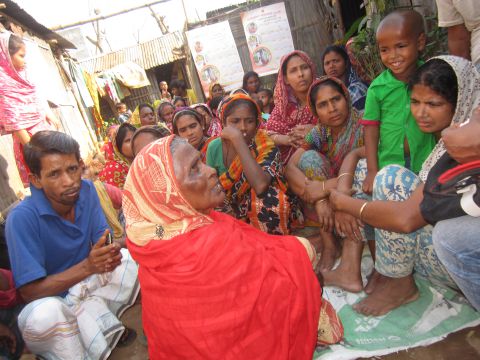An elderly woman describing her experiences at a courtyard meeting on 19 March about buying water from distant places as Kingshuk Balurmath Basti, Mirpur-1 has no water connection

An elderly resident of a slum in Mirpur, Dhaka, discusses problems accessing water
By Salma Rahman
Water and sanitation problems disproportionality effect the poorest and most marginalised in society. This is certainly the case here in Dhaka, where people living in slums are among the most underserved for access to clean and hygienic facilities. Rural-urban migration can put pressures on city authorities and utility providers, but it’s clear to see that this state of affairs is not good enough.
In fact, almost all the slums in Dhaka City are struggling to access WASH facilities. Even if some have water pumps established by Wasa nearby, quality of water is so poor that it is adversely affecting the health of slum-dwellers. Addressing the problem we arranged a week-long campaign in 10 slums of Dhaka City. In a way, it is uncharted territory; with no or very little WASH related intervention from NGOs.
It also means that local people need to participate in decisions made about their access to these potential new services. For building their awareness we conducted a series of courtyard meetings with slum-dwellers where we discussed the water and sanitation situation of that particular place, and collected their demands for a changed and healthier place to live.
We will initially be presenting these demands to duty bearers, but encouraging a direct dialogue with the residents to give the best chance of long-term success so that gradually, all the slums of the City can be connected to much-needed facilities. Helping us in providing the necessary information to arm local people in their demands are two very engaged slum-based organisations- Nagar Daridra Basteebashir Unnayan Sangstha (NDBUS) and Nogor Bostibashi Unnyan Songstha (NBUS).
Our advocacy work around this year’s World Walks for Water and Sanitation is proving that, in spite of the currently dire situation in Dhaka’s slums, the authorities are willing to engage on this crucial issue. Respective duty bearers pledged to attend the rallies on 21st and 22nd March. This is hopefully just the start of meaningful engagement.
Another part of our campaign is meeting with the duty bearer at Mohakhali Sattola Slum, right at the heart of the capital and ironically, adjacent to the Dhaka Water Supply Authority (Wasa), on 29th March alongside our partner DSK.
In August 2014, Dhaka Wasa made a commitment to provide legal water connections to all the slums including Sattola by the end of this year. Indeed, this meant that some changes in the situation could be seen at Sattola, with several water points. But the commitment is yet to be fulfilled and that huge area still has problems with its overall water and sanitation situation. So, our objective of our end of March program is to discuss the way ahead with duty bearers.
Our mission now is to make sure these promises are kept, and trying to push for more than basic provision. We are trying to make the case that water and sanitation are indeed human rights – and this means that what is provided needs to be safe, accessible to all, sufficient and acceptable for use. Helping those on the fringes of society can be a difficult and complex business, but we are optimistic about what can be achieved through mutual cooperation.
Salma Rahman is Program Coordinator for FANSA-BD